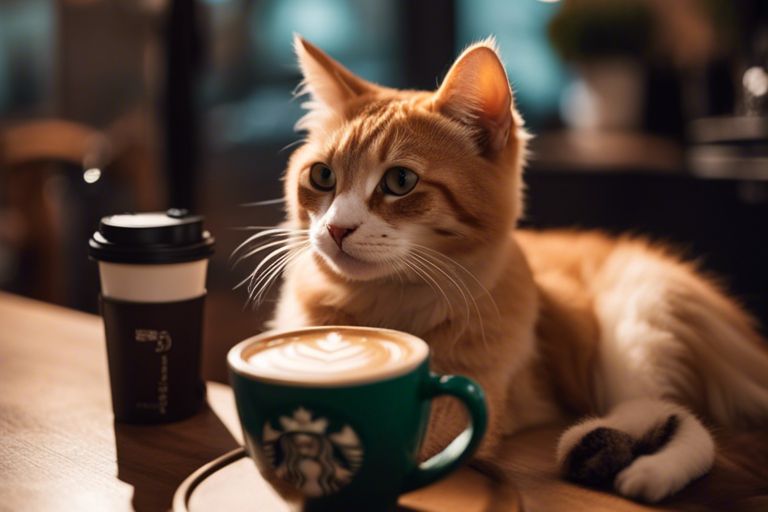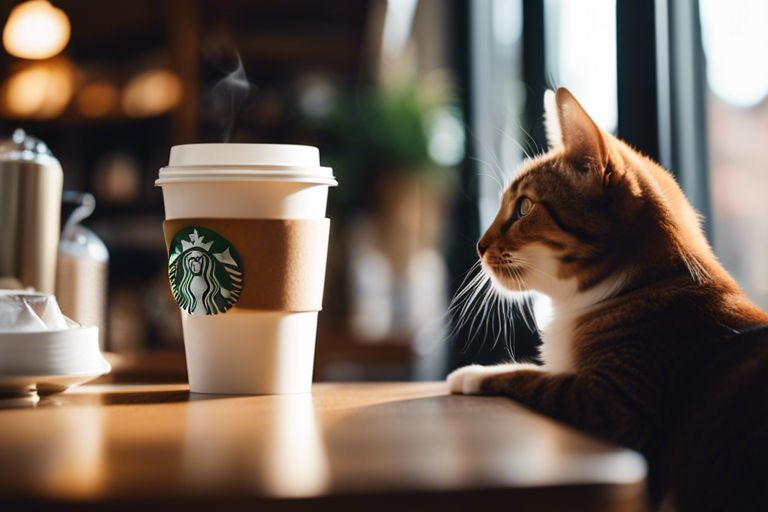If you’re a cat owner who also enjoys a trip to Starbucks, you may be wondering if it’s safe to share a Pup Cup with your feline friend. While the idea of treating your cat to a special treat from a popular coffee shop may seem appealing, it’s important to understand the potential risks and dangers before indulging your pet. The truth is, pup cups are specifically designed for dogs and can contain ingredients that are harmful to cats. Before you consider sharing a Pup Cup with your cat, it’s crucial to take into account the specific dietary needs and sensitivities of felines. Let’s take a closer look at whether or not cats should have Pup Cups from Starbucks.

Understanding Pup Cups
Assuming you are a pet owner and a Starbucks enthusiast, you may have heard of the term “pup cups.” These are often seen as a treat for dogs, especially those who accompany their owners on trips to the popular coffee chain. While pup cups may seem like a fun and harmless indulgence for your furry friend, it’s important to understand what they are and whether they are safe for your pet to consume.
What Are Pup Cups?
Pup cups are small, typically free, servings of whipped cream that Starbucks offers as a treat for dogs. They are not part of the official Starbucks menu, but many locations are happy to provide them upon request. The idea is that your dog can enjoy a sweet treat alongside you while you sip your favorite Starbucks drink.
Ingredients in Pup Cups
Most pup cups from Starbucks consist of just one ingredient: whipped cream. While whipped cream may seem harmless, especially in small quantities, it’s important to note that many commercial whipped creams contain high levels of sugar and fat. While these ingredients may be fine for an occasional treat, they can lead to health issues if consumed regularly or in large amounts by your dog. Additionally, some dogs may be lactose intolerant, leading to gastrointestinal discomfort if they consume dairy products like whipped cream.
Feline Dietary Needs
If you are a cat owner, you are responsible for ensuring that your feline friend receives proper nutrition to maintain their health and well-being. Cats have specific dietary needs that are different from those of humans or dogs. Understanding these needs is crucial in ensuring that you provide the best care for your furry companion.
Essential Nutrients for Cats
When it comes to your cat’s diet, it’s essential to ensure that they receive all the necessary nutrients to support their overall health. This includes a balanced mix of proteins, fats, vitamins, and minerals. Protein is particularly important for cats, as it supports their muscle development and overall energy levels. Taurine is an essential amino acid that cats cannot produce on their own and must be included in their diet. Additionally, essential fatty acids such as omega-3 and omega-6 play a crucial role in maintaining your cat’s skin and coat health.
Potential Hazards in Human Foods for Cats
It is crucial to be aware of the potential hazards that certain human foods can pose to your feline companion. Some common human foods can be toxic to cats, such as chocolate, onions, garlic, and caffeine. These foods can lead to severe health issues, including organ damage or failure. Additionally, bones from fish, poultry, or other meats can pose a choking hazard or cause internal injuries if ingested by your cat. While it can be tempting to share your favorite treats with your cat, it is important to be mindful of their specific dietary needs and potential hazards in human foods.

Cats and Pup Cups
Your furry feline friend is undoubtedly a cherished member of your family, and you want to make sure they can enjoy a treat now and then. With the rise in popularity of pup cups from Starbucks, you may be wondering whether it’s safe to share this indulgence with your cat. It’s important to understand the potential risks and alternatives before offering your cat a pup cup.
Lactose Intolerance in Cats
Cats are lactose intolerant, which means their digestive system cannot properly process lactose, the sugar found in milk and dairy products. Giving your cat a pup cup, which is usually made with whipped cream, can lead to gastrointestinal upset such as diarrhea, vomiting, and stomach discomfort. It’s important to avoid giving dairy-based treats to your cat to prevent digestive issues.
Alternatives to Pup Cups for Feline Treats
While pup cups may not be suitable for your cat, there are plenty of other safe and enjoyable treats you can offer. Consider giving your cat specially formulated cat treats, such as freeze-dried meat or soft chewy treats. You can also offer small pieces of cooked, unseasoned meat as a delicious and safe alternative to pup cups. Always make sure to choose treats that are specifically designed for cats to ensure their health and well-being.

Expert Opinions and Recommendations
Despite the appeal of treating your cat to a puppuccino from Starbucks, it’s important to consider expert opinions and recommendations before doing so. It’s always best to seek advice from professionals when it comes to your pet’s diet and health.
Veterinary Advice on Cats and Dairy
When it comes to cats and dairy, it’s a well-known fact that many cats are lactose intolerant. This means that they lack the enzyme lactase needed to properly digest lactose, the sugar found in milk and other dairy products. Feeding your cat dairy, such as the whipped cream found in pup cups, can lead to gastrointestinal issues such as diarrhea, vomiting, and stomach cramps. It’s best to avoid giving your cat any dairy products, including pup cups, to prevent any potential discomfort or illness.
Best Practices for Treating Your Cat
When it comes to treating your cat, it’s important to remember that not all human foods are safe for them to consume. While it may be tempting to indulge your feline friend with a pup cup, it’s essential to remember that their digestive systems are not equipped to handle certain ingredients found in these treats. Instead, opt for cat-specific treats that are specifically formulated to meet their nutritional needs. This will help to ensure that your cat stays healthy and happy without putting them at risk for any negative side effects from consuming unsafe foods.
Is Catnip Safe for Cats to Ingest if They Have Consumed Pup Cups from Starbucks?
If your cat has consumed pup cups from Starbucks, it’s important to monitor their behavior and contact a veterinarian if any unusual symptoms arise. Catnip tea for cats tutorial can offer tips on how to soothe their stomach and alleviate discomfort, but always consult with a professional for specific advice.
Can Cats Have Pup Cups From Starbucks?
On the whole, it is not advisable to give pup cups from Starbucks to your cat. While they may seem like a fun treat, the ingredients in these cups, particularly the dairy and sugar content, can be harmful to your cat’s digestive system and overall health. It’s important to be mindful of what you feed your feline friend and to stick to treats and snacks specifically formulated for cats. If you want to treat your cat, opt for a small piece of cooked meat or a cat-friendly snack instead.
FAQ
Can cats have pup cups from Starbucks?
No, it is not recommended for cats to have pup cups from Starbucks. These treats are meant for dogs and may contain ingredients that are not suitable for feline consumption.
What could happen if a cat consumes a pup cup from Starbucks?
A:Consuming a pup cup from Starbucks could potentially cause digestive issues in cats. The ingredients in these treats may not agree with a cat’s stomach and could lead to vomiting or diarrhea. It’s best to avoid giving them to cats altogether.
What are some safe alternative treats for cats?
There are plenty of cat-friendly treats available in pet stores or even homemade options using ingredients such as cooked chicken, fish, or catnip. Always consult with a veterinarian before introducing new treats to your cat’s diet to ensure they are safe and appropriate for feline consumption.

Hello there, I am Iftekhar Ahmed. I am the owner of Mishka & The Cat Corners. I love to explore and write on various topics about cats

